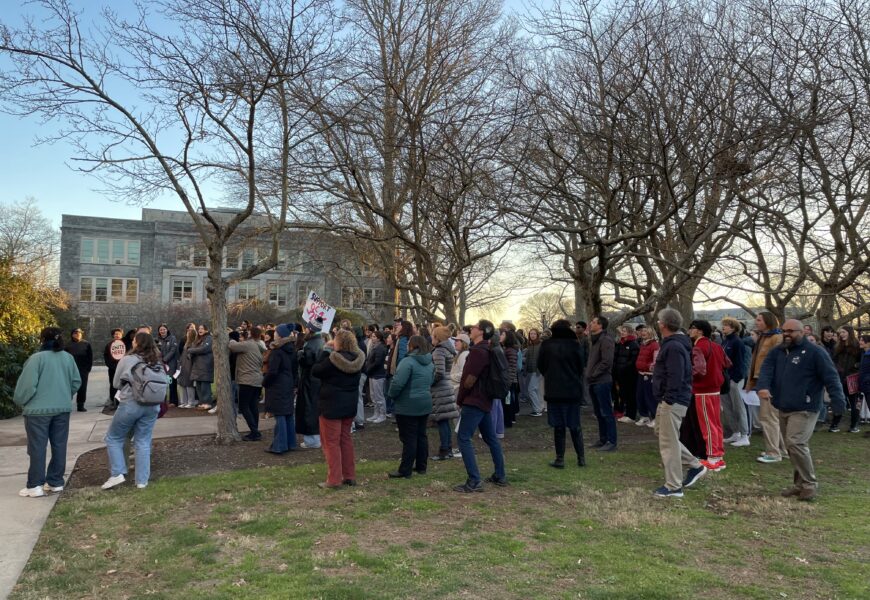Photo Courtesy of Kevin Lieue ’26
On December 14, 2023, Connecticut College faculty, staff, and students gathered to rally in support of the dining staff’s collective decision to inaugurate a union on campus. Organized with the help of UNITE HERE Local 217 — an organization that helps serve union efforts for hospitality workers across Connecticut — the demonstration helped emphasize part of a wider discourse that has since become a mainstay with students, staff, and faculty.
Since December, there has been an outpour of campus-wide support for this now-inaugurated union. Flyers have been put up in locations far and wide, including staff testimonials in Harris Refectory, faculty endorsements in Crozier-Williams, and student letters of support in Cummings Arts Center, among other places. Beyond this, it is also estimated that ~850 students recently signed a petition drafted by the Local 217 chapter in support of the union’s formation. Among the dining staff, 93% of workers voted ‘yes’: a near-unanimous approval. This union promises to provide opportunities for job stability, growth, and a more ethical and energetic culture of working. It could also allow Connecticut College, as an institution, to finally compete with fellow NESCACs such as Trinity College in Hartford where, after intermittent demonstrations, workers have begun to earn upwards of $23.85 per hour.
Case for Inauguration:
While the word ‘union’ has subliminally been in the air for the past 30 years, it is only since 2020 that it has gained a more profound recognition on campus. Several workers from all three of Conn’s dining locations mention the COVID-19 pandemic as the first pivotal moment. Dining staff workers, designated as essential staff, were required to come in without the prospect of earning hazard pay. This, combined with low hourly wages and general safety concerns, led to much of the workforce quitting, which has since led to understaffing and longer hours for the remaining staff, including shift alternation between dining halls on especially busy days. Mio, a dining employee, worked at Harris for 6 years before relocating to the dining hall at Jane Addams House, citing difficulty serving a continually increasing influx of students during peak hours.
As previously mentioned, conversations with dining staff also revealed low hourly wages as a recurring factor in ensuring union solidarity. Multiple staff members lamented the little scope for career advancement within their respective positions and an even rarer opportunity for a pay increase, with the highest-paid employee earning $20. With rent costs within the New London area reaching upwards of $1,900, some workers have found themselves working second jobs, leading to tighter shifts and more strenuous day-to-day living. The quality of food has also been placed in a state of neglect, with faulty machinery (such as ovens, refrigerators, and dishwashers) being put to the task of handling an ever-increasing number of servings.
More recently, however, there have been additional fears and anxieties from the dining staff about putting into practice ideas introduced by a private consultancy firm. Just this past month, the HR office sent out an email discussing the administration’s proactive approach toward assessing the validity of outsourcing Dining. As a result, staff are worried that jobs for certain dining positions, some already held by staff, could potentially be put on sites such as Indeed.com as part of an effort to possibly routinize job efforts. Conversations with dining staff have revealed a sense of feeling slighted by this potential development, presenting concerns regarding job security and retention.
Trust in School:
However, this is not to say that the staff feels entirely skeptical about all recent developments. Many workers expressed their faith in Interim President Wong’s promise to “respect [the dining] employees’ decision and […] bargain with the union upon request.” Mio, the aforementioned J.A. employee, also cited President Wong’s prior experience with union politics at his previous institution of employment as instilling some faith in future negotiations.
To be sure, the administration’s efforts have also, on a pragmatic level, been beneficial. The installation of the new, functioning slat conveyor belt in Harris has been especially useful in the rapid parsing of dirty plates during rush hour, as duly noted by members of the dining staff.
Promises of a Better Future:
Ultimately, what has been expressed in every union-advocating demonstration, flyer, and leaflet is the promise of security, safety, and retention. Within the guarantee of a union is also embedded an overwhelming sense of fraternity: many permanent dining workers have been working for over 5 years, becoming part of a wider culture of belonging within the campus’ social fabric. Standing at the grill at Harris, they chat with students about daily happenings; working the cash register at Oasis, they joke about recent sports games: it is all part of a larger energy that they enjoy being a part of. In the words of one Oasis employee, “[We] do this for you guys. You’re part of the reason we’ve stayed.”










